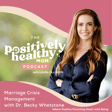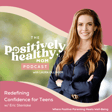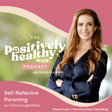Introduction to Elaine Taylor-Klaus
00:00:08
Speaker
Hello and welcome to today's episode of the Positively Healthy Mom. I'm your host, Laura Olinger, and today I've got Elaine Taylor-Klaus, who is the CEO and co-founder of ImpactParents.com.
Struggles as a Parent of Complex Kids
00:00:22
Speaker
So Elaine, tell us little bit about yourself and your background. First, thank you for having me. I'm thrilled to be here. um I am a mom of what I call three complex kids who are now young adults. My youngest is now 23 and my oldest is
Discovering and Becoming a Certified Coach
00:00:39
Speaker
30. I guess my daughter-in-law is in her mid-30s.
00:00:42
Speaker
and um And when I was a mom to young children, i was struggling a lot. yeah I felt like there was a lot of support out there for kids and not a lot out there for parents.
00:00:54
Speaker
And the long story short is I discovered... coaching somebody coaching me and I realized like it made all the difference in the world for my family.
Teaching Coaching Tools to Parents
00:01:04
Speaker
And so I went back to school and became a certified coach and i have been coaching parents of complex kids since 2009, I guess, 2008. And nine yes two thousand eight um and the The differential is that I work predominantly with parents of what I call complex kids.
00:01:25
Speaker
So kids who struggle with life, learning, behavior, emotion issues, social issues, um often maybe diagnosed, maybe not, maybe with ADHD or autism, anxiety, learning disabilities, those kinds of things. Mm-hmm. Mm-hmm.
00:01:41
Speaker
And so it was such a pleasant surprise when I realized that I own your book. Even before this podcast podcast was scheduled, I've had this for a couple of years on my bookshelf and it is such a wonderful resource. So what do you feel like is was your goal or the purpose to of writing this book?
The Essential Guide to Raising Complex Kids
00:02:00
Speaker
So, so this is the second book that I've written, the essential guide to raising complex kids. And I wrote it because, um so if I go back, as I say, we've been coaching parents, uh, of complex kids
The 'Coach Approach' to Parenting
00:02:15
Speaker
for many years. And at some point we realized that there was some fundamental training that parents were missing. In 2015, we, we created a program called sanity school for parents.
00:02:26
Speaker
And in that program, we teach, uh, neurodiversity inclusive coaching skills to parents and professionals. And we started doing that in 2015. We started training professionals in 2017.
00:02:41
Speaker
And the first book, Parenting ADHD Now, came out in there somewhere, and it was a book of strategies, which is great. And yet it felt like it was still missing the foundation.
00:02:52
Speaker
And so the book is really a coach approach to parenting. Mm-hmm. and It really brings in foundational tools from the world of coaching, which is a change management kind of modality, and um and was really designed to be that foundation for any parent to try to get their head around what it means to raise kids who are struggling in some aspects of their lives, kids and young adults.
Effective Communication and Empowerment
00:03:16
Speaker
Yeah, so I love that term, the coach approach to parenting. It's something that I've learned about. um actually, I think I first learned about it through the Gottmans, Dr. John and Julie Gottman. And so I've adopted that with my profession, with what I do. And so to explain the coach approach to parenting to our audience, well how would you describe that?
00:03:38
Speaker
Well, so Gottman is a piece of it for sure. um ah that when in the emotion management, trigger regulation kinds of issues we teach, we use a lot of Gottman's modality. um The coach approach, so coaching is a method of of change management that's very established. It's well-documented, it's well-researched.
00:03:56
Speaker
It's fairly new compared to therapy.
Phases of Parenting
00:03:58
Speaker
um And it's been around, I don't know, 30 to 50 years, depending on who you've talked to. Yeah. um and And so when I talk about the coach approach, we actually teach coaching tools, skills, and concepts to parents.
00:04:13
Speaker
Because coaching, it's kind of a way of communicating differently. It's an empowerment-based approach to helping people create change. And what do we want for parents more than anything is to empower our kids to to see the possibility and create change for themselves. And so Coaching becomes this really effective way, not coaching per se, but taking a coach approach, because I want parents to continue to be their kids' parents.
00:04:42
Speaker
But if you can have these tools in your toolbox as a parent, when your kid's dealing with something and you have the capacity to say, what do you need from me right now? and and to be able to meet them where they are, which is a key coaching concept, right? And so maybe that's supporting them with guidance, but maybe it's supporting them with more coach-like approach, more collaboratively.
00:05:04
Speaker
guiding them through their process of problem solving instead of that tendency parents have to kind of try to fix it for them or solve for them. We want to enroll our kids in solving for themselves. And coaching is a great vehicle for us to learn to do that.
00:05:19
Speaker
Yes, yes. i could like Parenting is a daily process of letting go. coaching is a coach the coach approach helps you do that in a really constructive way that keeps relationships strong.
00:05:32
Speaker
Yes. Yes. i'm I'm loving the way you're you're putting this out there because what comes up for me is just the idea of asking questions instead of telling. And I think so many parents are just in the mode because from when they're little, you know, we're trying, we're we're in that time where we're trying to get them out the door and get the shoes on and right. and we end up tell, tell, tell, quit your shoes and put your dad right. Instead of, um you know, what do you need to do today to make sure you get out the door on time? Right. Like coming up with the organic question in the moment that suits them, but it empowers them. is Does that resonate with you?
00:06:06
Speaker
Totally. There's actually a a section in the book that you were just holding up called Ask, Don't Tell. And and in our framework, what we've begun to see is that there are kind of four phases that parents go through in parenting.
00:06:19
Speaker
um And it's not linear. It's not a direct line. It's not like, okay, I'm out of phase one and I'm into phase two. It kind of depends on what your kid needs. But what you're describing is that tendency we parents have to start with directing. And it's reasonable and appropriate to be a director when our kids are little.
00:06:35
Speaker
Mm-hmm. gay The goal, the game is to move out of director and into collaborator as soon as we can. And that's kind of phase two. And then when we can to move out of collaborator and into supporter.
00:06:48
Speaker
And most of the work of parenting, of really effective hair ah parenting happens in that space between collaboration
Strengths-Based and Positive Parenting
00:06:55
Speaker
and support. When we stop directing them, we can actually begin to collaborate with them and help them start directing themselves.
00:07:03
Speaker
And then we move into support role. And while we're at it, what's the fourth phase? is well champion um Most of us want to be there way before our kids are ready.
00:07:14
Speaker
And um that's when they come to us for sage counsel and advice and and wisdom. And we would like them to be doing that at 15. But really, typically, we're not doing most of our champion parenting until our kids are probably out of the house.
00:07:28
Speaker
he Yeah. Beyond that. Yeah. And then the next thing that came up for me as you were talking is one of the key coaching concepts is to always view your client with positive regard and having this positivity bias.
00:07:43
Speaker
And I think that's where a lot of parents struggle as well, where we're so caught up in our daily grind that we kind of get into our own negative. And then we might view our child's behaviors as negative, especially complex children. And it can really just drag the whole system down. So what are your thoughts about that?
00:08:01
Speaker
Oh, absolutely. mean, there's not a parenting program out there in the world that doesn't have a positivity component, right? no Positive of parenting is effective. Just to understand that positive parenting doesn't just mean being nice.
00:08:15
Speaker
right Positive parenting is about creating ah an environment um that really sets our kids up for success, that plays to their strengths, that sees their capacity, helps them see it for themselves.
00:08:28
Speaker
I find, particularly in working with parents of, again, what I call complex kids, is that parenting is really powerful and taking a strength-based approach is super important for these kids.
Seeing Children as Individuals
00:08:40
Speaker
It's also not enough. It's not enough. Like i I went through in the early years, i went through a lot of those programs where, you know, whether it's Nurture Art or some of those other 1, 2, 3 Magic, it's where there's You want to bring positivity and love, and you want to be able to set appropriate boundaries and all of that good stuff, and it is good stuff.
00:09:01
Speaker
And we also have to begin to understand how to set expectations that are appropriate to where our kids are. Because I think where we end up get struggling, and we so we have a whole module on positivity, but we also have a whole module on positivity.
00:09:17
Speaker
ah setting expectations or shifting expectations. Yeah. Where we get stuck is we look at our kids and we're say we say, well, you're 14, you should be able to X. You're 16, you should be able to.
00:09:32
Speaker
And really we need to look our our kids individually and say, okay, you're 14 and developmentally that means you can do this. But in this area, you're still struggling and you may be developmentally more 14 going on 12. So we may need to adapt to meet you there right now.
00:09:47
Speaker
That doesn't mean we're not going to get but we want to set the hurdles in a way that's attainable for them so they can get the success because the success breeds more success. So we want to give them opportunities to be successful, that they can build on that and feel good about that and want to keep trying.
00:10:07
Speaker
Yes. And I like that because what came to mind was um also comparison. I think parents and and I catch myself doing it myself where it's crazy that my 12 year old is fully capable of a b and C, but yet my 15 year old can't blah, blah. Right. And so then parents say, well, how is it that your younger sibling can do it, but you can't. Right. And so then we spiral down and then it's a disaster. Right.
00:10:31
Speaker
Right. I think just like seeing them as individuals and where they are and see their strengths and kind of coach on that. And what else? Like what else as far as something else to that point? Yeah.
00:10:44
Speaker
Development is not a straight line. a Kids develop in lots of different arenas and the lots of different areas. And they may be kind of growing in one area, but the other area, which you think they should be able to do, they're not focusing on that right now. They're focusing on something else.
00:11:02
Speaker
and so And sometimes if they're really focusing on one area, another area may actually fall back a little bit for a little while. Mm-hmm. development, it's not linear.
00:11:13
Speaker
It's all happening at once. And so the game as a parent is to kind of figure out where do they need me to step in and where do it they need me to so to pull back and to do it in ah in a collaborative way where we're working together as a team and they're not we're not building resentments on either side. That's great.
00:11:33
Speaker
Okay. So where does the dealing with like what we you call the complex kids, what are you know, what is the message or what is the helpful tips that you can give to the moms that are listening today that has to do with, because it is a wide range that you describe complex kids, you know, like what would be some just general advice besides like, okay, so i I'm going to take this coach approach. It's like, well, and and what, like, what else is there?
00:11:59
Speaker
Well, if there's a lot, I would say there's a lot within the coach approach, right? Range within it.
Learning from Mistakes
00:12:05
Speaker
um One of the really profound things that I think we parents can do to help our set our kids up for success, regardless of what's going on with those kids, is to create an environment that makes it okay to make mistakes the and and two to challenge and manage our own perfectionism, um to empower them to step out of perfectionism. A lot of our kids begin to model our perfectionism, and it's not always the healthiest thing that they model.
00:12:34
Speaker
um So to create an environment where making mistakes is okay, where we understand that people learn from mistakes, that our kids see that that's how people learn and grow and change and that that it's not about avoiding mistakes. It's about making making every mistake a new one, right? Learning from it and adapting to it. So that's, I think, one huge construct that parents can bring ah parenting is to really create a... ah ah an opportunity, an environment where kids can feel safe failing forward and and feel safe asking for help. a lot of times our kids really resist asking for help, particularly tweens and teens, even into young adults.
00:13:17
Speaker
And if they're resisting accepting help, There are usually a few things going on. It's either usually that they're not ready for it um or that they don't want to need it or that it's maybe not being offered in a way that's really feeling empowering to them. right You say, i put this system in place and they won't use it. Well, that's because they haven't been part of creating it. Yes.
00:13:41
Speaker
And so we want to really invite them to ask for and accept help. And one of the most powerful ways we can do that is by modeling it for them. And showing them the ways that we ask for help and and accept help and invite help and And when we don't beat ourselves up for needing help or don't try to do it all ourselves, you know, that straps mentality um doesn't always work well with with kids who are already struggling with other things. we need we We want to send them the message that sometimes people struggle with things and that's okay. And we we can't do it all ourselves. you know, what I say is to parents a lot is I don't cut my own hair.
00:14:20
Speaker
i don't do my own taxes. There are all kinds of things I ask for help. And over the years, as I've done more and more coaching, I've gotten better and better at asking for help.
00:14:31
Speaker
And as a result, my kids don't resent always the need for help. a Younger kids are better at asking for help than my older kid. new It's older when I started doing this work, right?
00:14:45
Speaker
um but But the more they can learn that, the better the success they'll have in their lives. Yeah. Yes. It's so funny. I, have a story from when I was a little girl, I was getting, we were at Disney world and I was getting off the monorail and my mom wanted to hold my hand, but because I was two, two, I think I was two.
00:15:07
Speaker
I didn't want her help. I wanted to get off by myself because I was perfectly capable of walking off by myself. Well, of course it's like five o'clock and everybody's rushing off to get ready for dinner. And she was afraid I was going to get trampled.
00:15:19
Speaker
So she grabs my hand and kind of pulls me off the monorail and I I just laid down on the ground screaming bloody murder because I was humiliated and I was insulted and I felt just such anger that she didn't see my me as capable.
00:15:35
Speaker
So it's this funny story because in my head, I've always labeled myself as, because I think I even said me do it. And so I've labeled myself as the me do it girl. Yeah. Where I hate getting, hate having to ask for help. I don't like it, especially from my parents, because I'm like, they didn't see me as this capable person.
00:15:52
Speaker
And so it's like, you know, modeling those, you know, mistakes or the need for help. It just like, hey, we we all need this, right? Like we all need to hold to getting off the monorail when it's really busy, even if you're two or if you're 20, right? Like, let's, let's be together. So yeah I think that's such an ah important idea. And i think really probably very much needed. Yeah.
00:16:14
Speaker
for the mom question Well, and, you know, I was talking to my one of my daughters the other day. ah My middle kid is 27, is in med school, um is studying for an exam. And and we were we were talking about this very issue because i was raised in a very perfectionist home where there were things I didn't do because I would rather not do them than do them wrong.
00:16:37
Speaker
and my my Actually, my eldest at 16 said to me, said that's those words to me almost exactly, don't you see, mom, if I haven't done it, I haven't done it wrong. my What happens when we get too afraid to accept help is that we get kids who are going to avoid doing things that are healthy or fun or good for them or whatever, because they would rather not do it than do it wrong.
00:17:01
Speaker
Mm-hmm. Mm-hmm. Yeah. And here I am at 60 years old. taking um an art class for the first time in my life because finally i'm i'm okay with maybe not being that good at it.
00:17:15
Speaker
think it'll be fun. Yeah. A lot of years I avoided it because I wasn't going to be good enough. Hmm. Yeah. So what, what, what, ah what an exciting new time for you where you're opening up these new possibilities. Cause art can never really be wrong, right? Like, like there is no wrong. And so, yeah, just like building on that skill of like, oh maybe this isn't great, but I'm proud of it. I love it. This is my creation, whatever kind of comes to your mind. And so is really awesome. And with two young adult kids now going,
00:17:46
Speaker
Way to go, mom. Good job. You know, like they're now encouraging me in it because they get that that that's
Setting Boundaries and Limits
00:17:54
Speaker
okay. Not to be at it.
00:17:57
Speaker
Yeah, yeah. I love this. So as a parenting coach, what that one of the things i see a lot of is parents struggling to set boundaries with, you know, the kids who are getting their first phone, or getting their first video game system. And it's all this stuff with a technology and not setting boundaries.
00:18:17
Speaker
boundaries. And but I see some people who are very, you know, rigid where, okay, it's out of the bedroom, and we have screen time, and it has to charge here and this and this and this and this and this.
00:18:30
Speaker
And I think that's great for the families that that works for. And that doesn't fit every personality. So like, what are your just general thoughts off the top of your head of like,
00:18:41
Speaker
a system that would be helpful for the the personality, the parent who doesn't have those structures in place, but still want to have some boundaries. Well, and so it's so interesting. Lately, I've been making a distinction between boundaries and limits.
00:18:56
Speaker
and And boundaries are what we put in place for ourselves. the Limits are what we as parents might it might put on our kids. no And so the distinction, first I'll say, is that what I'm hearing you saying is what are can some appropriate, how do parents put limits on devices and on kids' use of technology in a way that's that's not going to create pushback and resentment?
00:19:20
Speaker
and And I think the most important part is to go back to that concept of collaborative and col collaboratal collaborative problem solving. think as parents, we have to identify what are our basics?
00:19:33
Speaker
What are our foundations? What are the pieces beyond which? If I'm a parent that's just not going to let it in the bedroom or that it's got to go off at 11 o'clock or whatever it is, know what your boundaries are first as a parent.
00:19:46
Speaker
But then you get into a conversation with your kids and ask them, what do they think are appropriate limits for them? what are Before you get to making the decision, listen to them, hear them, hear why they think it's appropriate.
00:20:00
Speaker
And then you can come back and you can have a conversation, almost a negotiation with them around establishing clear limits that everybody agrees to. Then you've got their buy-in, you've got their engagement, you've got their ownership.
00:20:12
Speaker
And then you get to let the, sit and you you want to, when you set limit, you also want to have clear expectations that are agreed upon about what will what will happen if they if the limit is broken.
00:20:25
Speaker
so right How do you want me to handle it when? It's 11 o'clock, it's time for the device to go off and you're saying one more minute, five more minutes, 10 more minutes. What do you think I should do?
00:20:36
Speaker
And so you're not just getting them to buy into the to the limit, but also to the consequence. who The beauty of that, Laura, is that is that When we get on the same team with our kids, then the system becomes the bad guy.
00:20:50
Speaker
Right. Get to be able to stay in relationship with them. Man, I'm so sorry. I know this is not this. It really stinks that you have to lose your technology for or it really stinks, whatever the consequence was that you agreed to. hmm.
00:21:06
Speaker
Now you get to be on the team with them instead of the enforcer. And I think as parents, if we can stay out of the role of enforcer, particularly with preteens and teens, right?
00:21:16
Speaker
If we can stop thinking that we're the enforcer and start helping helping them take responsibility for the accountability that they
Acknowledging Children's Feelings
00:21:27
Speaker
then we get to stay in relationship with those them and we keep building trust. a That's foundational because otherwise you're going to get sneaky behaviors. You're going to get avoidance behaviors. You're going to get defensive or oppositional, all of those other behaviors you don't want.
00:21:44
Speaker
You'll get when you're kids don't feel like you've trusted them and that that they can trust you. a Yeah. I think that everything that you just said was just brilliant ingenious and genius and spot on and can apply not to just technology, but at really any limits.
00:22:00
Speaker
And I love the distinction with boundaries and limits. I think that's really helpful in any context. If it's context you know if it's driving and going out with friends or whatever it might be, but to kind of collaborate and decide that together and then agree upon um the consequence in advance. And it was funny, um you know, I do a lot of, and I saw in your book too, there's a lot of just like brain health and brain science and the human brain, you know, was originally just to build and and and um kind of develop so that we can survive.
00:22:33
Speaker
And it's also developed to conserve energy. And so if you think about it, it's 11 p.m. at night, everybody's exhausted. And that's when like things start to deteriorate because both brains, you know, the teenager and the parent, you know, they're trying to conserve energy. And so that's when like these eruptions can happen. Whereas if you even can say, hey, you know,
00:22:53
Speaker
Let's not have an 11 o'clock conversation. like Let's talk about this, you know, when thing where we're going to have this conversation yeah at noon on a Sunday and we're feeling well rested and we're well fed and we can have this plan together. That way we won't be tired. We won't have these fights or whatever happens, you know, when we're exhausted.
00:23:09
Speaker
Yeah, absolutely. And, and, Sometimes that means at 11 o'clock saying, I get that you don't see it my way. And right now is not the best time to have this conversation.
00:23:20
Speaker
So for now, we're going to do this. I hear that you're not happy with it. i I'm listening to you. And here's when. So we want to make sure that they know when that issue is going to come back, where they're going to be listened to.
00:23:32
Speaker
And so if you haven't done it in advance, you can close it off in those moments of upset by acknowledging what their experience is. I get that this is not the outcome you want tonight. And I'm really sorry that you're so disappointed. And I and i don't blame you. I would be if I were you too. And right now we've got to stop.
00:23:51
Speaker
We're going to pick this up tomorrow. We can talk about it during the day tomorrow when both of us are fresh. Right now we're too tired. It's a great example of of how we can acknowledge them and still hold our boundary, ah right?
00:24:04
Speaker
In order to get back to the place where you can reevaluate or re reconsider the limit with them. Yes. And then do and do any repair work if needed then, right? If if there was any damage done to the relationship, we can repair it at that time or repair in the moment and then maybe repair again. um The acknowledgement is the beginning of the repair, right?
00:24:25
Speaker
So as soon as you acknowledge what they're going through, if, if, as soon as we say, this isn't that important, why are you getting so upset? Yeah. You should be grateful. Like as soon as we say anything that dismisses how they're feeling, the we we've lost a lot of credibility and trust.
00:24:44
Speaker
here If we can start by acknowledging, i get, this is so frustrating for you, annoying for you. You're pissed at me, whatever it is, I get it. And that's real. If we can acknowledge their feeling as real,
00:24:58
Speaker
so much trust for our capacity to be able to problem solve moving forward.
Relationship-Based Parenting
00:25:03
Speaker
Yes, that's so true. And it sounds so easy, and it's not always easy because we get triggered. And one of the best little tips I ever heard was from a parenting expert years ago. She said, You know, when your kids are little or you were little and you got a balloon at a birthday party or the grocery store or something, and inevitably, you know, you let go and it floats up in the sky and the child is just distraught and on the ground. She said, imagine if that's your cell phone and your wallet flying up in the sky.
00:25:33
Speaker
How upset would you be? and that just shifted everything for me right there. I thought, oh, now I know how to put myself in my child's shoes. Now I know because that's what it means to them, right? That's how important is to them.
00:25:47
Speaker
Well, and what you're saying and the most important part, I think, of what you're saying is that they're humans, right? They're humans having their own experience, their own feelings, their their own relationship with whatever the dynamic is.
00:25:59
Speaker
And, you know, once you get into kids who are preteens and teens and older, like they're not three year olds who are so um malleable to your wishes. Like they have their whole job at that age is to individuate and separate and to have their own goals and dreams and visions.
00:26:15
Speaker
They're now more motivated by pleasing themselves than they are about pleasing you. well we may not want to hear that developmentally, that's appropriate for them. Yes. yeah And so we've got to acknowledge what they're, you wouldn't say, you wouldn't just go into your best friend and take away their phone.
00:26:33
Speaker
You'd have a conversation. We need to recognize that our kids are separate, independent, autonomous human beings and treat them that way. Not to give up our authority, but that's to show respect for their individuality.
00:26:47
Speaker
a I love that. That's wonderful. Elaine, what else? you know Is there anything else? I feel like this is a really powerful conversation. I feel like we covered a lot. Is there anything else that you're like, oh, i just have to share this?
00:27:01
Speaker
um I don't think so. I mean, I think we've covered a lot. And and at the end of the day, like there's a lot of alignment in what I'm hearing you say and the work that we do. That's that that who we are and how we be as parents really matters.
00:27:16
Speaker
a And it's more important how we be in relationship with our kids than what we do. and And I think that sometimes as parents, we get stuck in that hamster wheel of doing.
00:27:29
Speaker
if there's If there's anything you can do to shift the dynamic, it's to recognize that your kids are separate and independent beings. And your primary goal is to really be in relationship with them.
00:27:42
Speaker
a Stand them well enough to help them understand themselves. that's they'll learn to manage themselves. a Beautiful. That's beautifully said. I love it.
Accessing Resources through ImpactParents.com
00:27:52
Speaker
So where can people find you going forward?
00:27:55
Speaker
Well, so we have a ah robust website at impactparents.com. And if you go to impactparents.com slash podcast, you can get to our, we have a Parenting with Impact podcast um and all kinds of resources, free downloads, ah hundreds and hundreds of blogs dating back to 2011. So there's a lot of really, really amazing resource.
00:28:17
Speaker
and information on the website. Perfect. Well, thank you, Elaine, so much for your time. I, again, was so honored to have you on my show and thank you for your time. I appreciate it Thanks for having




















